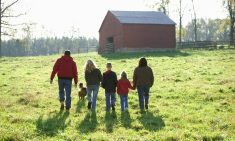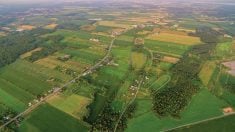Increasingly, Canada’s farmers are looking to leadership programs to help them achieve more and to give their operations and people their best chances for success. Programs create confidence — which, we’re learning, is an incredibly productive outcome all by itself — they build new networks and ways of thinking, and they inspire better team performance.
But it all has to start with a choice. Which program should you sign up for?
The choice is wide. Do you need hard business skills, like learning financial and organizational skills to keep the business performing at its peak? Or do you need soft skills to better manage staff, build loyalty and grow your partnerships?
Read Also

‘No agenda, no attenda’: How to professionalize your family farm meetings
Establishing meeting ground rules can help a farm family find ways to communicate that work for the business and the family.
Options range all the way from youth programs like 4H and the Cattle Young Leaders programs to mid-career programs like CTEAM and a full range of workshops, e-courses and conferences, plus the Advanced Agricultural Leadership Program (AALP), the National Farm Leadership Program (NFLP) and the Nuffield Canada Agricultural Scholarship as three premier offerings.
[RELATED] New school: The business concept that reshaped the Meunier farm
Since its formation in 1984, close to 500 Ontario farmers and agri-business operators have completed the 18-month AALP program. The experience consists of six to seven in-person seminars across the province, two virtual Zoom gatherings with global agri-food leaders, and two study tours — one North American (five to 10 days) and one international (10 to 14 days).
Topics range from government and political systems to marketing, communications, negotiating and the dynamics of change, plus much more.
Program director Gabe Ferguson says AALP is “a personal leadership journey … Each class is created with attention to the diversity of the participants so peer-to-peer mentorship, interrelationships, and a broad network are developed.”
AALP targets people in the (primarily) Ontario agricultural industry between the ages of 25 and 55 who want to invest in themselves to reach their potential, and also want to help those around them to do the same. Up to 30 participants are recruited for each class.
Visit ruralontarioinstitute.ca/aalp/ for more on AALP.
While AALP concentrates on group learning and travel, Nuffield Canada caters to those who will explore the world individually. This $20,000 scholarship provides a unique opportunity to mid-career individuals in agriculture, whether in primary production, industry or governance to:
- Tap into one of the world’s most extensive food and farming networks
- Achieve personal development through experiential learning, travel and studya
- Deliver long-term benefits to Canadian agriculture through what they learn
“The program focuses on the goal of attracting scholars who are ready to challenge themselves in a program of international travel and study,” says Theresa Whalen, executive director of Nuffield Canada.
[RELATED] Editor’s Note: The real thought leaders in agriculture
Nuffield Canada is part of the larger Nuffield International community with members from Argentina to Zimbabwe.
Steven Larocque, a well-known Alberta crop advisor and owner of Beyond Agronomy, was a 2008 Nuffield Canada scholar. His study led him to be amongst the first to implement controlled traffic in Western Canada.
When Larocque finished his scholarship, he stated “After my two years the world is smaller, my business is more profitable and the farmers who hear my story are inspired. I can’t say enough about the opportunities that continue to generate through this wonderful network of like-minded passionate people.”
The scholarship requires a minimum of 10 weeks travel, of which six must be consecutive, and must be completed within 24 months. Recipients can come from any field of agriculture including livestock, grain or vegetable production, and they may work in a variety of roles within the industry, including owners, managers, employees, administrators or civil servants.
Applicants apply with a proposal covering what they wish to study and why it is relevant to Canadian agriculture. Upon completion of the scholarship, a written paper and verbal presentation are made and scholars are expected to promote their new knowledge across their industry.
They are also expected to give back to the program by helping to recruit new scholars and serving on the national board or committees.
John Cote, a 2019 Nuffield Canada Scholar from Saskatchewan who is co-owner of Black Fox Farm & Distillery, says “The key to success in life and business is continuous learning. Nuffield offers this opportunity to grow and learn, but more importantly it introduces you to a network of amazing individuals who share the same passion.
“Nuffield not only allows you to grow as an individual but allows your team at home to gain from the experience as well. By encouraging you to be away from your business, you empower your team by your absence and by sharing your journey with them.”
More information about Nuffield Canada can be found at nuffield.ca.
Farm Management Canada, in partnership with LeaderShift, a Manitoba-based leadership development firm, offers three farm leadership opportunities, the foremost being the National Farm Leadership Program (NFLP).
The NFLP consists of 11 weeks of online programming (January to April) including weekly meetings to apply the teachings.
In March, there’s an in-person residency that provides a safe learning environment to practice key skills. Monthly group and personal coaching continues for the remainder of the calendar year to help participants realize positive change in real time.
The program’s goal is to deliver practical tools and techniques that help participants become the best version of themselves and to lead where and when it matters — navigating complex issues, handling emotional or difficult situations and people (including yourself), empowering others and building personal resiliency.
Participants say the program has benefited them both professionally and personally. Some indicate it has made them not only better people to work with, but improved their marriage and family life as well.
Others say it helped identify unhealthy work habits which had been affecting not only themselves but their team, peers and family, and more participants became less fearful of conflict, which enabled them to have more open conversations and to respond to difficult situations more appropriately.
In 2021, an alumni program, NFLP 2 was launched to help participants stay in practice and re-take their leadership effectiveness assessment to identify additional areas of growth.
Also in 2021, a one-month online only leadership program called InSight was launched as a precursor to the National Farm Leadership Program. It’s designed to help participants understand the root causes of workplace drama and how people can adapt their behaviours for better results.
Visit leader-shift.ca/ for information on all of these programs.
Many universities and colleges, as well as ministries of agriculture across the country also have leadership programs, albeit some are not specifically geared towards farmers. The University of Alberta offers a general certificate in leadership, as do Conestoga College and the University of Guelph in Ontario.
While specific agriculturally focused leadership training programs may not be numerous across the country, farm managers have many more options when it comes to technical and business management skills development opportunities. Many are listed at the National Farm Business Management Resource Centre at takeanewapproach.ca.
Ag-based college and university often offer short training programs, sometimes for free.
Recently the University of Guelph developed a Foundations in Agricultural Management course which is advertised as being an opportunity for participants to “explore agricultural business strategy and planning, farm management, succession planning and financial fundamentals.” It is free, on line and can be done at an individual pace.
Longer established is the Canadian Total Excellence in Agricultural Management (CTEAM) program offered through the Agri-Food Management Excellence organization which aims to help farmers improve their management skills.
Over 20 days, participants learn to make better decisions about strategy, finance, marketing, operations, human resources, succession and other business functions. CTEAM exposes participants to successful agribusiness operations through tours during its four modules across Canada.
Past participants say one of the biggest benefits of the CTEAM program is that their real-life data is compared against national and regional benchmarks. By analyzing their own strengths and weaknesses over the process of the course, they develop a strategic and operational plan for their farm with which they can hit the ground running.
Amy Cronin of Bluevale, Ont., has participated in AALP, CTEAM and is currently doing a Nuffield Scholarship. She believes that each of the programs helped form her thinking, but in different ways.
She says “Until AALP, my days were filled with farming and family. AALP broadened my perspectives and allowed me to explore my leadership skill set which directly influenced my decision to enter into ag leadership locally, provincially and federally. It was through CTEAM that my husband and I began to delve into the numbers and think about how to break away from our self-learned management styles.”
Nuffield is a different program, and although she is currently in the middle of it, she feels it is stretching her in new ways. “I’m excited to learn from people around the world.”

It isn’t that one program is better than the others, Cronin says. Each program offers training that has influenced what she brings to the farm and what she contributes to her community. “The combination of the three (programs), in addition to my commitment to constantly better myself, has helped to make our farm what it is today.”
At Farm Management Canada, executive director Heather Watson, says farmers should look at how programs increase awareness and interest, and at how they are also designed to truly affect change. There’s a need for both, she says, “to meet farmers where they are in their learning journey and help them navigate towards improving their business skills and practices.”
Farm Management Canada’s flagship informational programs include the national Agricultural Excellence Conference. On the other hand, their Roots to Success Risk Management Training program, for example, is designed to take learning one step further. It not only changes how farmers think about managing farm risk but helps them adopt risk management practices on the farm.
Watson sees Nuffield, AALP, NFLP and CTEAM as highly complementary. “Any farm operation requires both business management on one side and then leadership on the other. ”
Also don’t overlook that while support provincial grants to enroll in skills development training have been decreasing, there are still some regions that offer support. Farmers in B.C., Saskatchewan, Manitoba, New Brunswich, Newfoundland, P.E.I., and Yukon Territory may be eligible for up to $2,500 cost-share funding.
The Canada Job Grant is a federal incentive that also helps reduce the costs associated with third-party training programs. Support varies from province to province. In most provinces, a business can receive up to 100 per cent of eligible training costs to implement training programs that lead to improved skill sets, and farms as recognized employers are eligible to apply for the program.















